Former Mayor Ron Nirenberg and U.S. Rep. Joaquin Castro (D-San Antonio) have both publicly kicked the tires on a potential statewide campaign in 2026, but so far neither San Antonian appears to be expanding their donor base or raising big money for such a race.
Campaign finance reports covering the first half of 2025 were due Tuesday and Nirenberg, who has been floating the idea of running for governor against Republican Gov. Greg Abbott, reported about $7,000 in his city campaign account.
As his mayoral tenure was winding down last year Nirenberg also launched a federal PAC called One Community, which has raised about $25,000.
Abbott is one of the most prolific fundraisers in Texas history and just hauled another $20 million in the past six months.
Castro, meanwhile, is among a long list of Democrats who’ve signaled interest in Texas’ 2026 U.S. Senate race.
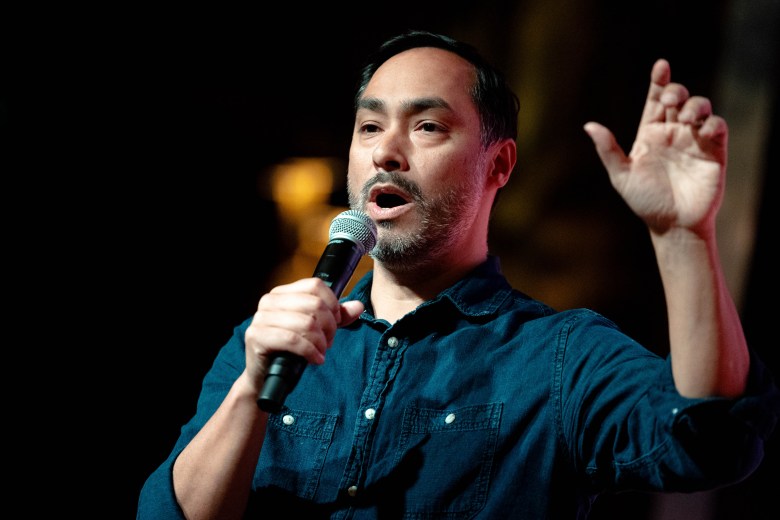 U.S. Rep. Joaquin Castro speaks at a Town Hall on Stable Hall on Friday June 27. Credit: Brenda Bazán / San Antonio Report
U.S. Rep. Joaquin Castro speaks at a Town Hall on Stable Hall on Friday June 27. Credit: Brenda Bazán / San Antonio Report
GOP infighting between U.S. Sen. John Cornyn (R-Texas) and his scandal-ridden primary challenger, Attorney General Ken Paxton, has made it an appealing opportunity for ambitious Democrats — some of whom are already raising big money for the race.
Campaign finance reports covering Jan. 1 through June 30, however, indicated the Westside congressman had raised about $172,000 so far this year, and reported about $168,000 on hand. He doesn’t have a PAC, according to a campaign spokesman.
“It seems like there’s a disconnect between the rumor mill and the speculation and what’s actually being raised,” said San Antonio political consultant Bert Santibañez. “Those numbers don’t reflect that someone is getting ready to announce a statewide campaign.”
Big opportunities
In a state where Democrats have long struggled, Castro and others believe their best shot at cracking a statewide office is in the midterm of a Republican’s presidency, when their supporters are likely to be the most engaged.
“I think that’s where everybody should go all in,” Castro said on a Texas Tribune Fest panel in 2023. “That’s when you should have a very strong slate of your best candidates that are running for everything.”
Now President Donald Trump’s return has created such an opportunity this election cycle, but it’s unclear whether any San Antonians will take a leading role.
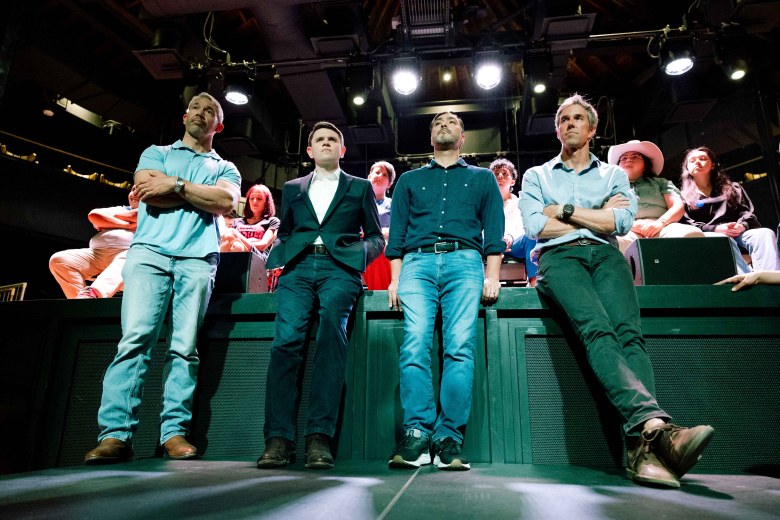 Former San Antonio Mayor Ron Nirenberg, State Rep. James Talarico, U.S. Rep. Joaquin Castro and Beto O’Rourke appeared together at a town hall at the Stable Hall last month. Credit: Brenda Bazán / San Antonio Report
Former San Antonio Mayor Ron Nirenberg, State Rep. James Talarico, U.S. Rep. Joaquin Castro and Beto O’Rourke appeared together at a town hall at the Stable Hall last month. Credit: Brenda Bazán / San Antonio Report
Castro hasn’t made up his mind about the U.S. Senate race, and would face a Democratic primary with former Dallas Congressman Colin Allred, who raised tens of millions of dollars for his 2024 race against U.S. Sen. Ted Cruz (R-Texas).
Another prolific fundraiser, Beto O’Rourke, is also considering the U.S. Senate race.
“Whether you like Beto O’Rourke or you like Colin Allred — everyone loves one, hates one — we can all recognize what they both did is they raise about $100 million for each of their elections in order to flip the state,” said Lillie Schechter a former chair of the Harris County Democratic Party, at a forum for Texas Democratic Party chair candidates over the summer.
Texas state Rep. James Talarico (D-Round Rock), another potential U.S. Senate candidate, reported about $700,000 on hand.
“Any candidate that’s going to come out of San Antonio for a statewide race … you’re competing with folks who are coming from other larger cities where there’s just a larger donor base with much higher contribution histories,” said Andrew Solano, a San Antonio-based political consultant who has also worked on many federal races.
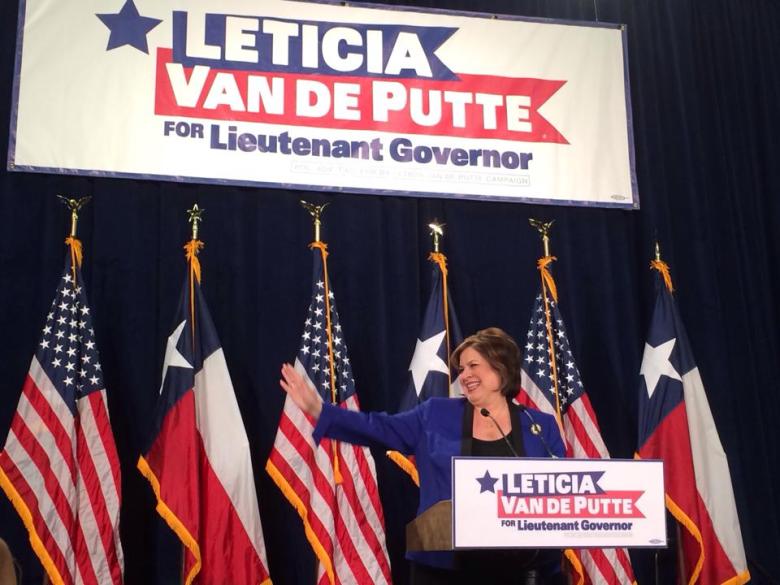 Leticia Van de Putte waves to a crowd of supporters, announcing her bid for lieutenant governor Nov. 23, 2013. Photo by Lindsay Rodriguez.
Leticia Van de Putte waves to a crowd of supporters, announcing her bid for lieutenant governor Nov. 23, 2013. Photo by Lindsay Rodriguez.
The last statewide candidate San Antonio produced was Leticia Van de Putte, a former Democratic state senator who served as Democrats’ nominee for lieutenant governor in 2014.
Given national Democrats’ continued interest in Texas, San Antonio political consultant Laura Barberena said there could still be a path in 2026 for candidates who can convince powerful outside groups, like labor unions, that they’re the right person for the job.
“[A candidate] doesn’t necessarily have to have the money, because the interest groups out there may already have it,” Barberena said. “They just need to pick who they’re going to go with.”
Here’s an early look at the fundraising shaping up ahead of other key 2026 races.
Texas’ 20th congressional district
If Castro were to run for U.S. Senate instead of reelection, his left-leaning 20th congressional district would draw interest from many local Democrats who’ve had few opportunities to move up in recent years.
State Rep. Trey Martinez Fischer (D-San Antonio), who also represents part of the city’s West Side, is sitting on roughly $390,000 in his campaign account.
Bexar County Commissioner Rebeca Clay-Flores (Pct. 1), a Democrat, has about $180,000 on hand. Clay-Flores isn’t up for reelection until 2026.
State and county officials aren’t subject to contribution limits like federal candidates are, so it’s easier to raise money but they can’t directly transfer it to a congressional campaign.
Tech entrepreneur Beto Altamirano, who finished third in the mayor’s race, has also been discussed as a potential Castro successor. He launched the Plan 210 PAC after that race.
Texas’ 28th congressional district
U.S. Rep. Henry Cuellar (D-Laredo) is defending one of the most targeted congressional seats in the country in 2026 — one that’s also in the crosshairs of the GOP’s efforts to redraw Democrat-held districts and make them more favorable for their party.
Cuellar serves on the House Appropriations Committee, helping make him a prolific fundraiser for many years. But his incoming contributions plummeted last year after he was indicted and he wound up spending campaign funds on his legal defense.
In the past six months Cuellar has raised about $250,000, loaned his campaign $200,000 and is currently sitting on about $360,000.
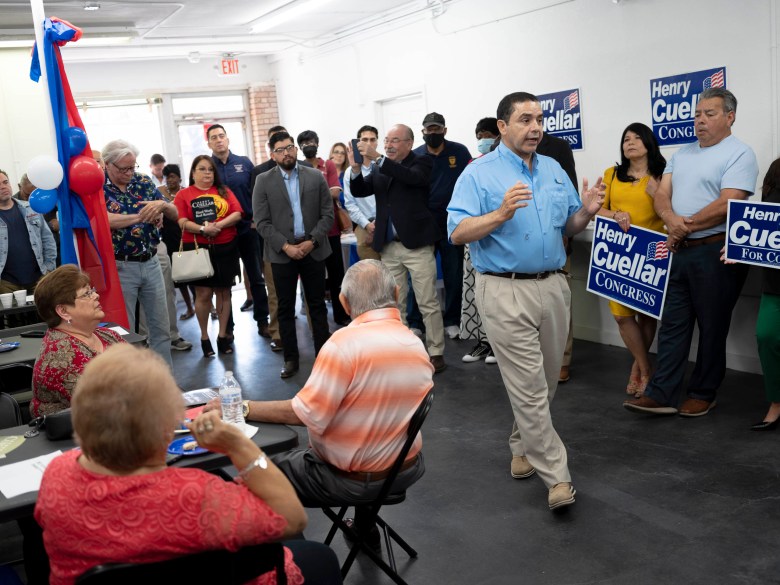 U.S. Rep Henry Cuellar greets guests at the opening of his San Antonio campaign office ahead of the 2022 election. Credit: Scott Ball / San Antonio Report
U.S. Rep Henry Cuellar greets guests at the opening of his San Antonio campaign office ahead of the 2022 election. Credit: Scott Ball / San Antonio Report
His highest-raising Republican challenger, Mayra Flores raised $325,000 and has about $140,000 on hand.
Webb County Judge Tano Tijerina, a top GOP recruit with a history of self-funding, formed an exploratory committee to consider the race but hasn’t started raising money.
Texas House District 118
Nearly all of Bexar County’s state lawmakers represent districts drawn solidly to favor one party. State Rep. John Lujan’s (R-San Antonio) Southside district is the exception, and regularly one of the most competitive, hard-fought seats in the state.
Lujan was rumored to be considering a state Senate bid in 2026, but announced plans to seek reelection instead. He raised $12,500 in the last reporting period, and reported about $26,000 in the bank.
Lujan appears headed to a rematch with Democrat Kristian Carranza, who was one of Texas Democrats’ biggest fundraisers on the House map last cycle. She raised $53,000 and has about $42,000 in the bank.
Texas House District 121
Freshman state Rep. Marc LaHood (R-San Antonio) is raising big money after finding himself at the center of a high-profile dispute with powerful GOP lobbying interests who’ve threatened a potential primary opponent this year.
LaHood helped shut down bills the deep-pocketed business group Texans for Lawsuit Reform wanted, but he’s amassed nearly $1.3 million headed into his first reelection race, thanks in part to big checks from the trial lawyers who stand to benefit from the move.
Bexar County races
Bexar County Judge Peter Sakai, who is running for a second four-year term in 2026, is sitting on $435,000. It’s unclear whether any fellow Democrats will challenge him, though several have been rumored to be considering it.
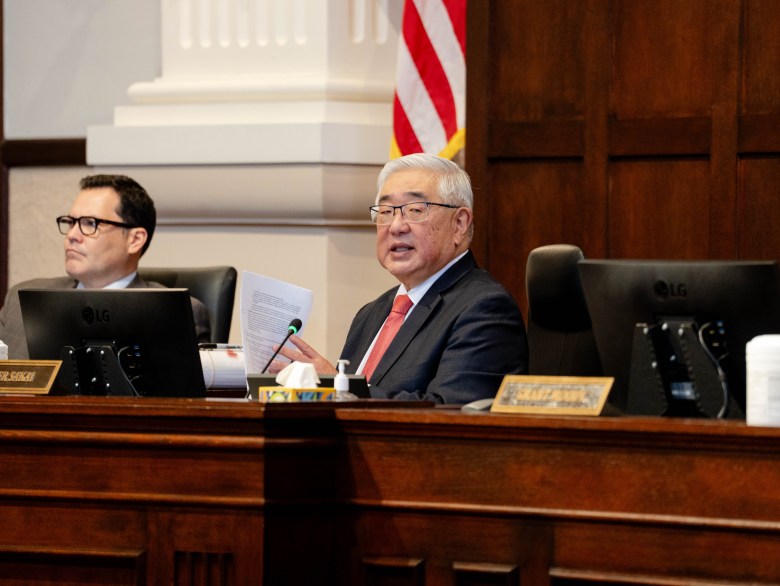 Bexar County Commissioner Justin Rodriguez (Pct. 2), left, and Bexar County Judge Peter Sakai, right, are shown at a commissioners’ court meeting. Credit: Brenda Bazán / San Antonio Report
Bexar County Commissioner Justin Rodriguez (Pct. 2), left, and Bexar County Judge Peter Sakai, right, are shown at a commissioners’ court meeting. Credit: Brenda Bazán / San Antonio Report
Two Bexar County Commissioner seats, Precinct 2 and Precinct 4, both represented by longtime Democratic incumbents, will also be on the ballot.
Commissioner Justin Rodriguez (Pct. 2) has close to $1 million banked in his campaign account. Commissioner Tommy Calvert (Pct. 4) has about $145,000.
The Bexar County District Attorney race will be one of hottest local races, now that incumbent Democrat Joe Gonzales isn’t seeking reelection.
Judge Ron Rangel, a Democrat, has a PAC that’s expected to start raising money for a potential DA bid, but hasn’t posted any public fundraising yet.
